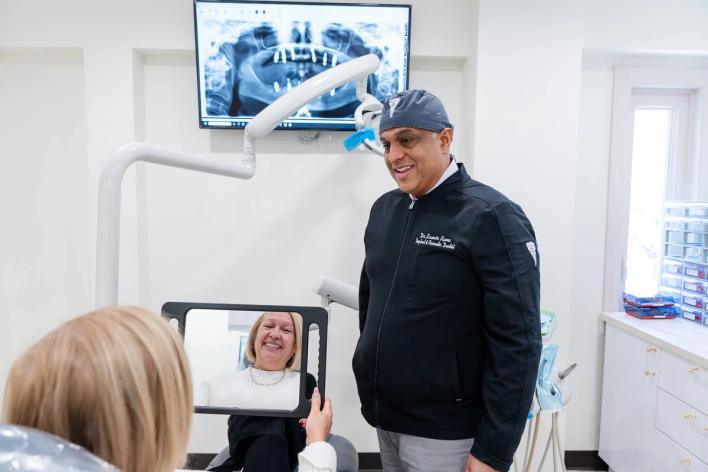Single-Tooth Implant vs. Dental Bridge
Published on Oct 8, 2025 | 5 minute read

You’re staring at a gap where a tooth used to be and wondering: should I choose a single-tooth dental implant or a traditional bridge? Both restore your smile and chewing function, but they work differently, feel different, and age differently. Here’s a clear, side-by-side guide so you can decide what fits your priorities today—and ten years from now.
How Each Option Works
A single-tooth dental implant replaces the entire tooth structure: a titanium post acts as the root, an abutment connects the parts, and a custom crown completes the look. The neighboring teeth are left untouched. A dental bridge anchors a replacement tooth (pontic) to crowns cemented on the two adjacent teeth. No surgery is needed for a bridge, but those anchor teeth are reshaped to hold crowns.
When a Single-Tooth Dental Implant Shines
• You want to preserve healthy neighbors. A single-tooth dental implant leaves adjacent teeth intact.
• You value bone health. Chewing forces travel through a single-tooth dental implant into the bone, helping maintain volume over time.
• You like the idea of a solution that can last decades. With proper care, a single-tooth dental implant is designed for longevity.
When a Bridge Makes Sense
• The neighbors already need crowns. Reshaping them for a bridge may be efficient.
• Health or timing limits surgery. A bridge can be completed quickly when a single-tooth dental implant must wait for grafting or healing.
• You prefer a non-surgical path and accept that future maintenance may be more frequent.
Timeline Differences
A single-tooth dental implant typically takes a few months from placement to final crown, allowing time for integration. Sometimes immediate temporary crowns are an option in selected cases. A bridge is usually finished in two visits over a couple of weeks. If speed alone drives your choice, a bridge wins—but the long-term picture favors a single-tooth dental implant for many patients.
Aesthetics and Feel
Because a single-tooth dental implant emerges from the gum like a natural tooth, the final result often looks seamless. Flossing is normal. Bridges can look excellent, too, but flossing requires threaders or specialized tools to clean under the pontic. If you’re committed to fastidious hygiene, either option works; if you prefer “set it and forget it,” a single-tooth dental implant often feels more natural.
Durability and Maintenance
The crown on a single-tooth dental implant may eventually need replacement due to normal wear, but the implant itself can last for decades. Bridges often need replacement when cement weakens, decay develops at the margins, or bite forces shift. Nightguards help protect both options if you clench or grind.
What About Cost?
Upfront costs for a single-tooth dental implant are typically higher than for a bridge. But when you project replacement cycles, many patients find the lifetime cost of a single-tooth dental implant comparable—or even lower.
Bone Grafts and Extra Steps
If the socket has shrunk or the sinus is low, minor grafting may be recommended to support a single-tooth dental implant. This is usually a straightforward addition that improves long-term stability. With bridges, the main extra step is reshaping the neighboring teeth and managing floss access. Neither route is “free” of trade-offs; it’s about choosing the set of trade-offs that aligns with your goals.
Common Questions
Will it hurt?
Local anesthesia and gentle techniques keep both procedures comfortable.
How long will it last?
A well-cared-for single-tooth dental implant is designed to last; bridges often need replacement in 10–15 years.
Which looks more natural?
In the front of the mouth, a single-tooth dental implant often edges out a bridge due to gum emergence. In the back, both can look indistinguishable from natural teeth.
Making a Confident Choice
List your top three priorities: preserving healthy teeth, long-term stability, speed, budget, and maintenance preferences. Bring those to your consultation, and we’ll map the option that checks the most boxes for you. If you have multiple gaps, we may mix solutions—for example, a single-tooth dental implant in front and a small bridge in back.
Ready to replace a missing tooth with a plan that fits your life? Call Comprehensive Dental & Implant Center at 973-791-7674 to Book an Appointment and learn whether a single-tooth dental implant or a bridge is the smarter move for your smile.

